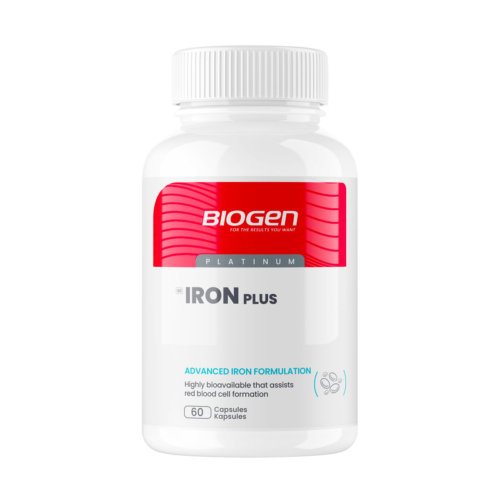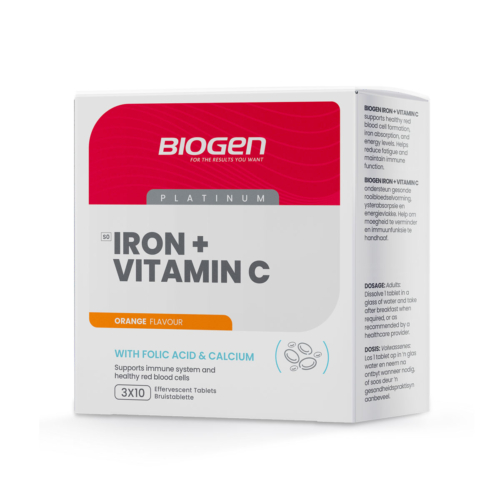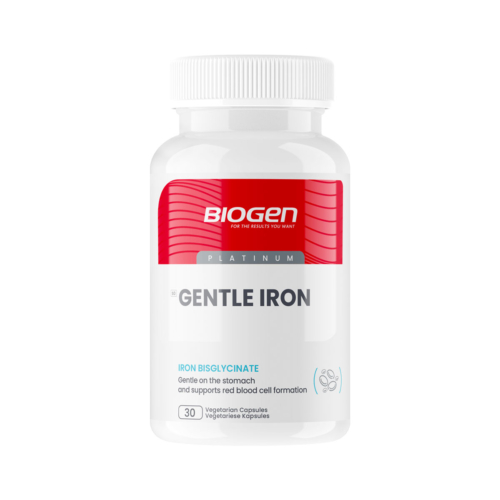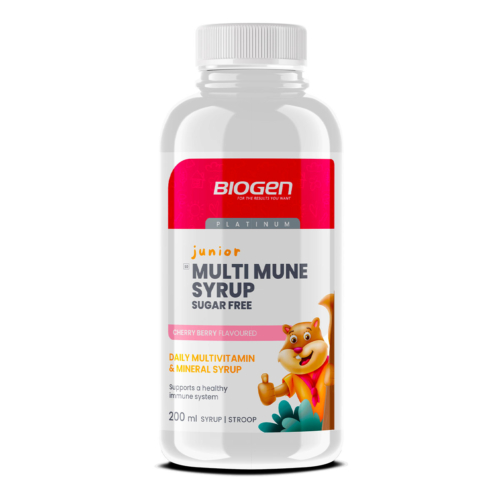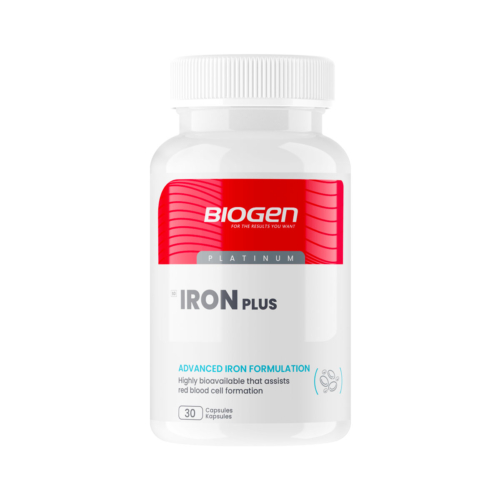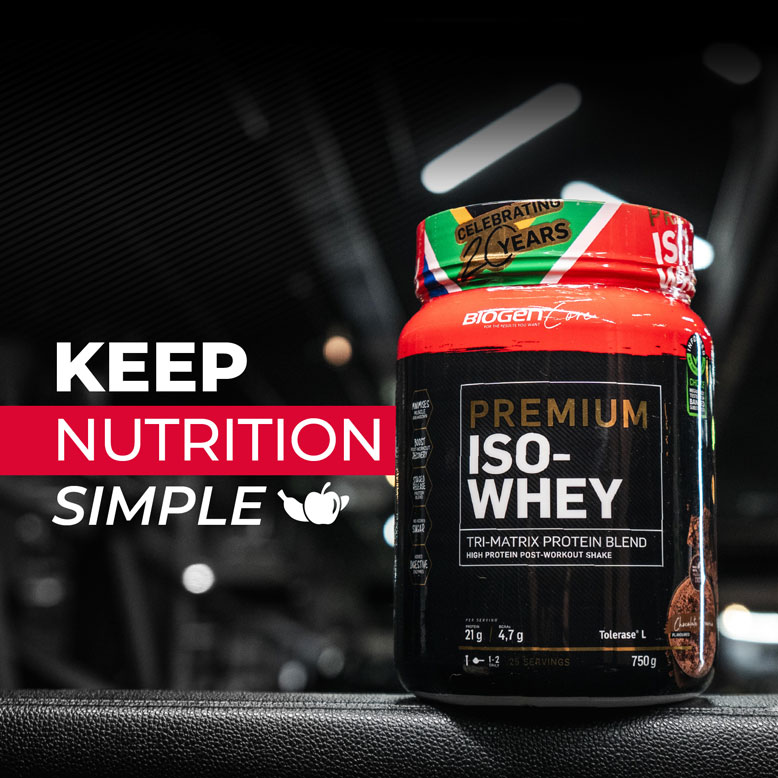
Iron is a vital mineral that plays a crucial role in numerous bodily functions, from transporting oxygen and supporting energy production to producing enzymes and hormones, and aiding the immune system.
The role of Iron in the body
Iron is a key component of haemoglobin, the carrier protein found in red blood cells that takes oxygen from the lungs to the brain, muscles and organs.
In terms of energy production, iron is involved in the process of converting food into energy by helping to produce enzymes essential for this process.
Iron also plays a role in proper immune system function as it helps produce immune cells and antibodies, and is an essential mineral for brain development and function, supporting cognitive processes such as learning, memory, and attention.
Additional roles include the production of several hormones and the formation of collagen, a protein essential for skin, bones, and connective tissues.
Meeting your iron needs
Getting adequate iron at every stage of life is essential for optimal health and development. A diet that contains a variety of iron-rich foods is crucial for maintaining optimal iron levels.
Meat is an excellent source of iron, with red meat, poultry, and fish providing an easily absorbed form called heme iron¹.
You can also get iron from legumes like lentils, chickpeas, kidney beans, and black beans, leafy greens such as spinach, kale, and collard greens, various nuts and seeds, including almonds, cashews, chia seeds, and flaxseeds, as well as fortified cereals and certain dried fruits.
Enhancing iron absorption
We can suffer from a lack of sufficient iron due to a lack of this mineral in a balanced diet, or from poor absorption.
You can maximise iron absorption by consuming foods rich in vitamin C, such as citrus fruits, strawberries, and tomatoes, alongside those that contain iron as these nutrients work synergistically to boost absorption.
It’s also important to avoid substances that inhibit iron absorption, like tannins in tea, coffee, red wine, beer, and certain fruits, such as grapes, berries, and unripe fruits.
Considering an iron supplement
While a balanced diet is key to meeting your iron needs, in certain instances, an iron supplement may prove beneficial. However, it’s essential to consult with a healthcare professional before starting any supplement, as excessive iron can be harmful.
People who could benefit most from an iron supplement may include:
- Infants and young children who are not consuming enough iron-rich foods or are at risk for deficiency.
- Adolescent girls due to menstrual blood loss and increased iron demands.
- Pregnant and breastfeeding women to meet the increased iron requirements during these periods.
- Individuals with certain medical conditions, such as heavy menstrual bleeding, gastrointestinal bleeding, or malabsorption issues.
- Vegans and vegetarians because plant-based iron is less readily absorbed than heme iron from animal sources.
- Older adults, if their dietary intake is limited or there are concerns about iron status.
Biogen stocks a range of suitable products that can help you meet your daily iron intake requirements, including products specifically formulated for children like Biogen Multi Mune Syrup; products that support better absorption like Biogen Iron + Vitamin C; and Biogen Gentle Iron for those who suffer from digestive issues.
If you suspect you might have iron deficiency, it is essential to consult with a healthcare professional for a proper diagnosis and treatment before starting any iron supplement, as excessive iron can be harmful.
References:
- Ems T, St Lucia K, Huecker MR. Biochemistry, Iron Absorption. [Updated 2023 Apr 17]. In: StatPearls [Internet]. Treasure Island (FL): StatPearls Publishing; 2024 Jan-. Available from: https://www.ncbi.nlm.nih.gov/books/NBK448204/.
- McCann S, Perapoch Amadó M, Moore SE. The Role of Iron in Brain Development: A Systematic Review. Nutrients. 2020 Jul 5;12(7):2001. doi: 10.3390/nu12072001. PMID: 32635675; PMCID: PMC7400887.
- Muckenthaler MU, Rivella S, Hentze MW, Galy B. A Red Carpet for Iron Metabolism. Cell. 2017 Jan 26;168(3):344-361. doi: 10.1016/j.cell.2016.12.034. PMID: 28129536; PMCID: PMC5706455.
- Soyano A, Gómez M. Participación del hierro en la inmunidad y su relación con las infecciones [Role of iron in immunity and its relation with infections]. Arch Latinoam Nutr. 1999 Sep;49(3 Suppl 2):40S-46S. Spanish. PMID: 10971835.
- Armah-Ansah EK. Determinants of anemia among women of childbearing age: analysis of the 2018 Mali demographic and health survey. Arch Public Health. 2023 Jan 19;81(1):10. doi: 10.1186/s13690-023-01023-4. PMID: 36658651; PMCID: PMC9854152.


